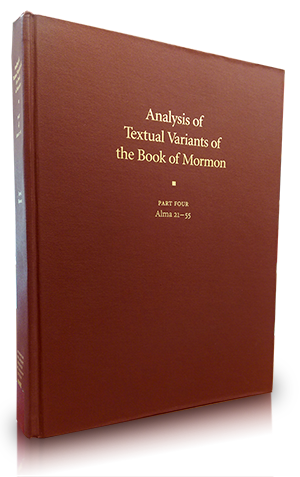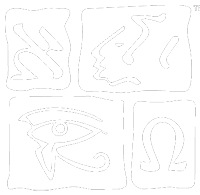About
The Critical Text Project

A stray drop of ink and a quirk of nineteenth-century penmanship make the difference between “retain that wrong” and “repair that wrong.” Only scrupulous attention to the earliest written manuscripts of the Book of Mormon can uncover such discrepancies. Professor Royal Skousen has spent more than twenty five years meticulously researching the original and printer’s manuscripts of the Book of Mormon, revealing discrepancies and making a case for the type of translation the Book of Mormon is. Every page, every sentence, every word, letter, and mark are accounted for in the landmark Critical Text Project, arguably the most important Book of Mormon research to date.
As director of the Maxwell Institute’s Willes Center for Book of Mormon Studies, I’m excited to announce that for the first time ever we are making the foundation of the Critical Text Project—Volumes one and two—available online. Volume four, which analyzes each textual variant found on the manuscripts and editions of the Book of Mormon, is also now available.
The Willes Center website features a Critical Text Project page which includes digital editions of volumes 1, 2, and 4, a video lecture series describing the project, a free introductory book written by a number of scholars who discuss the project, and a bibliography of articles Professor Skousen has written using his work on the Critical Text Project.
I express my gratitude to Professor Skousen for his ongoing work on the project, to Blair Hodges for managing the new website, and to the donors and supporters who have helped fund the project thus far. The Willes Center is the main venue for serious, academic research concerning the Book of Mormon. The Critical Text Project is an invaluable resource for any scholar or student of the Book of Mormon.
Royal Skousen

Royal Skousen is Professor of Linguistics and English Language at Brigham Young University. In 1972 he received his Ph.D. in linguistics from the University of Illinois at Champaign-Urbana. He has taught linguistics at the University of Illinois, the University of Texas at Austin, the University of California at San Diego, and as a Fulbright scholar at the University of Tampere in Finland. In 2001 he was a research fellow at the Max Planck Institute for Psycholinguistics in Nijmegen, Netherlands. Skousen's work in linguistics has dealt chiefly with developing a theory of language called Analogical Modeling, a theory that predicts language behavior by means of examples rather than by rules. He has published three books on this subject: Analogical Modeling of Language (1989), Analogy and Structure (1992), and Analogical Modeling: An Exemplar-Based Approach to Language (2002). More recently, he has published on the quantum computation of Analogical Modeling, notably in his 2005 paper "Quantum Analogical Modeling" (available at www.arXiv.org).
Skousen began working on the critical text of the Book of Mormon in 1988. In 2001 he published the first two volumes of the Critical Text Project, namely, typographical facsimiles for the original and printer's manuscripts of the Book of Mormon. From 2004 through 2009 he published the six books that make up volume 4 of the critical text, Analysis of Textual Variants of the Book of Mormon. This work represents the central task of the Critical Text Project, to restore by scholarly means the original text of the Book of Mormon, to the extent possible.
In 2009 Skousen published with Yale University Press the culmination of his critical work on the Book of Mormon text, namely, The Book of Mormon: The Earliest Text. The Yale edition presents the reconstructed original text in a clear-text format, without explanatory intervention. Unlike modern editions of the Book of Mormon that have added chapter summaries, scriptural cross-references, dates, and footnotes, this edition consists solely of the words dictated by Joseph Smith in 1828-29, as far as they can be established through standard methods of textual criticism. Later emendations by scribes, editors, and even Joseph Smith himself have been omitted, except for those that appear to restore original readings.
Books
- The Book of Mormon: The Earliest Text (2009)
- The Original Manuscript of the Book of Mormon (2001)
- The Printer's Manuscript of the Book of Mormon: Part One (2001)
- The Printer's Manuscript of the Book of Mormon: Part Two (2001)
- The History of the Text of the Book of Mormon (Forthcoming)
- Analysist of Textual Variants of the Book of Mormon: Part One (2004)
- Analysis of Textual Variants of the Book of Mormon: Part Two (2005)
- Analysis of Textual Variants of the Book of Mormon: Part Three (2006)
- Analysis of Textual Variants of the Book of Mormon: Part Four (2007)
- Analysis of Textual Variants of the Book of Mormon: Part Five (2008)
- Analysis of Textual Variants of the Book of Mormon: Part Six (2009)
- A Complete Electronic Collation of the Book of Mormon (Forthcoming)
Book Chapters
- "History of the Critical Text Project of the Book of Mormon" in Uncovering the Original Text of the Book of Mormon (2002)
- "Jacob 4–6: Substantive Textual Variants between Manuscripts and Editions" in The Allegory of the Olive Tree (1994)
- "John Gilbert's 1892 Account of the 1830 Printing of the Book of Mormon" in The Disciple as Witness (2000)
- "Manuscripts of the Book of Mormon" in To All the World (2000)
- "The Original Book of Mormon Transcript" in Reexploring the Book of Mormon (1992)
- "The Systematic Text of the Book of Mormon" in Uncovering the Original Text of the Book of Mormon (2002)
- "Translating and Printing the Book of Mormon" in Oliver Cowdery: Scribe, Elder, Witness (2006)
- "Translating the Book of Mormon: Evidence from the Original Manuscript" in Book of Mormon Authorship Revisited (1997)
Journal Articles
- Maxwell, Robert L. "Review of Royal Skousen, editor. The Book of Mormon: The Earliest Text. New Haven: Yale University Press, 2009." BYU Studies Quarterly 50:2 (2011): 178-182.
- Skousen, Royal. "Some Textual Changes for a Scholarly Study of the Book of Mormon." BYU Studies Quarterly 51:4 (2012): 97-117.
- Skousen, Royal. "Towards a Critical Edition of the Book of Mormon." BYU Studies Quarterly 30:1 (1990): 41-69.
- Skousen, Royal. "Review of Avraham Gileadi, The Book of Isaiah: A New Translation with Interpretive Keys from the Book of Mormon." BYU Studies Quarterly 28:3 (1988): 124-127.
- "Worthy of Another Look: John Gilbert's 1892 Account of the 1830 Printing of the Book of Mormon," Journal of the Book of Mormon and Other Restoration Scripture 21/2 (2012)
- "Conjectural Emendation in the Book of Mormon," The FARMS Review 18/1 (2006)
- "The Archaic Vocabulary of the Book of Mormon," Insights 25/5 (2005)
- "The Earliest Textual Sources for Joseph Smith's "New Translation" of the King James Bible," The FARMS Review 17/2 (2005)
- "The Pleading Bar of God," Insights 24/4 (2004)
- "'Scourged' vs. 'Scorched' in Mosiah 17:13," Insights 22/3 (2002)
- "History of the Critical Text Project of the Book of Mormon," Journal of Book of Mormon Studies 11/2 (2002)
- "The Systematic Text of the Book of Mormon," Journal of Book of Mormon Studies 11/2 (2002)
- "Findings about the Printer's Manuscript," Journal of Book of Mormon Studies 11/2 (2002)
- Noel B. Reynolds, and Royal Skousen, "Was the Path Nephi Saw "Strait and Narrow" or "Straight and Narrow"," Journal of Book of Mormon Studies 10/2 (2001)
- "Introducing the Dead Sea Scrolls to an LDS Audience," FARMS Review of Books 12/2 (2000)
- "How Joseph Smith Translated the Book of Mormon: Evidence from the Original Manuscript," Journal of Book of Mormon Studies 7/1 (1998)
- "The Original Language of the Book of Mormon: Upstate New York Dialect, King James English, or Hebrew?," Journal of Book of Mormon Studies 3/1 (1994)
- "Critical Methodology and the Text of the Book of Mormon," Review of Books on the Book of Mormon 6/1 (1994)
- "The Bible II," Review of Books on the Book of Mormon 6/2 (1994)
- "Jacob 4–6: Substantive Textual Variants (1992)," FARMS Preliminary Reports
- "The Critical Text of the Book of Mormon [Transcript] (1994)," FARMS Preliminary Reports
- "John Gilbert's 1892 Account of the 1830 Printing of the Book of Mormon (1997)," FARMS Preliminary Reports
